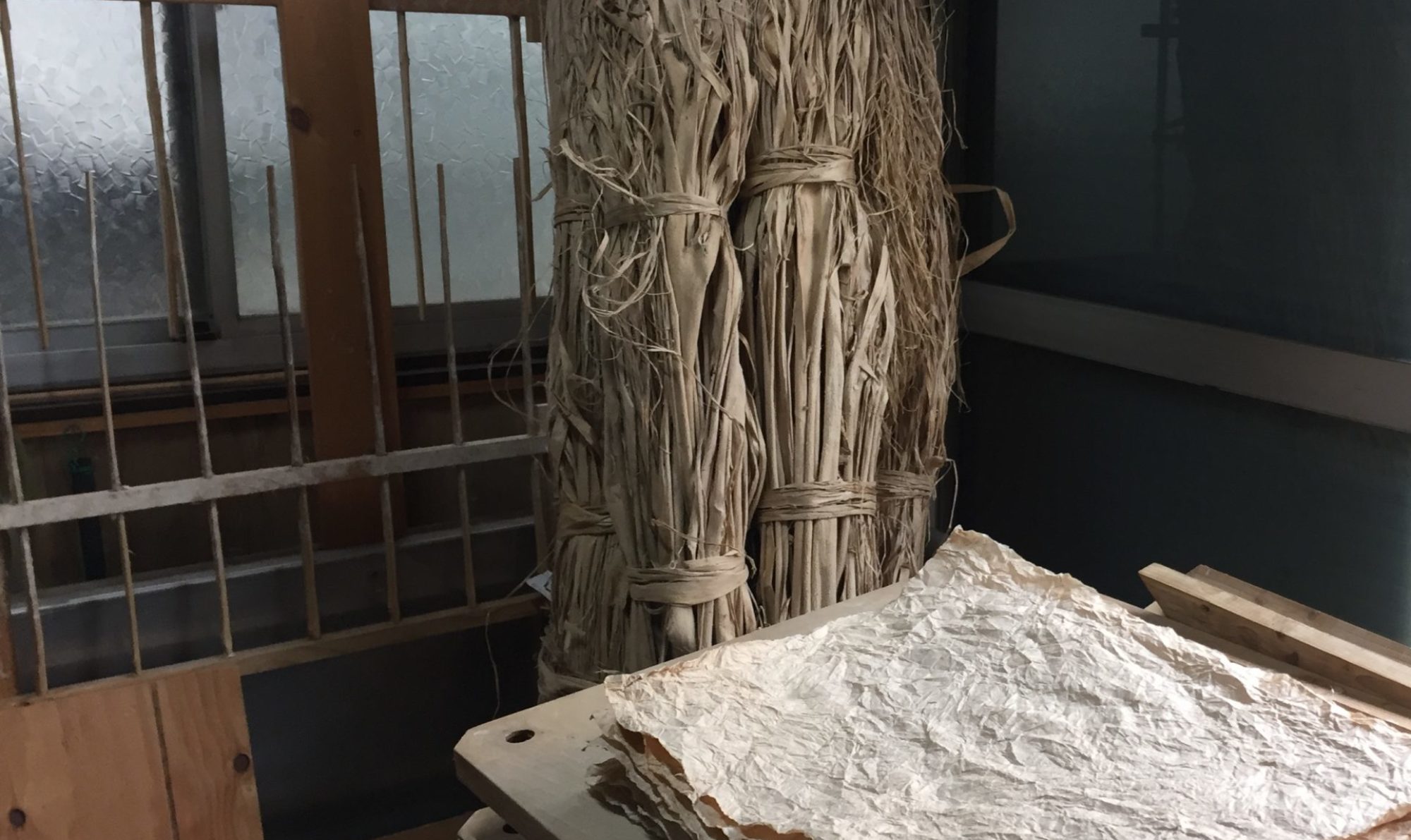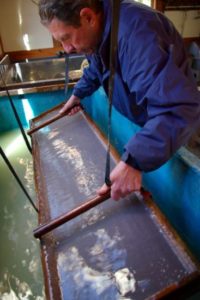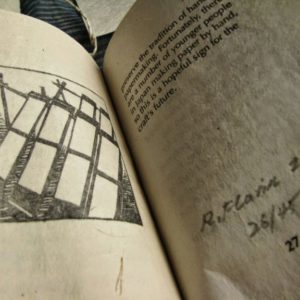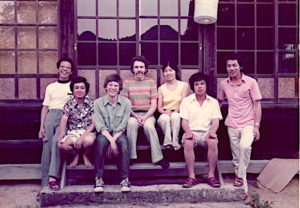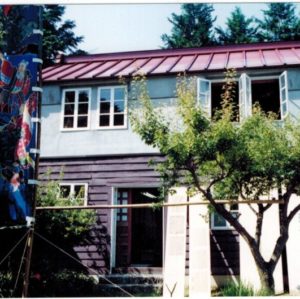Richard Flavin, with his own brand of quiet but infectious enthusiasm, was a printmaker, papermaker, letterpress printer, artist, and lover of Japan, old Japan, Japanese utilitarian antiques, and the Japanese people. An exceedingly gentle and kind person, Richard had an in-the-moment fascination with life and aesthetics that was gratefully taken in by the people around him. He was particularly attentive to Japanese hand papermaking and woodcut printmaking. Like Richard himself, his work was always honest, appreciative of nature, and in awe of our place in the cosmos.
Richard was born in Dorchester, MA in 1943, third child of five, to Thomas and Dorothy. Interested in art and design from a young age, Richard studied design at the Art Institute of Boston (1961-1965) before being drafted into the US Army in 1965. Following the end of his service at a base in South Korea, he sojourned briefly in Japan in 1968, curious about the country and its people. Returning to Boston, he found work briefly doing graphic design and illustration, but moved back to Japan in 1970. He married Haruko Itō in 1971.
With a developing interest in Japanese moku-hanga (woodblock printmaking), he applied to Japan’s best known school of art, Tokyo Geijutsu Daigaku (Tokyo University of the Arts), and was accepted as a non-degree student in 1972, taking courses there for two years. Working with Japanese handmade paper in the process of making his prints, he became interested in papermaking, and his papermaking studies began in 1976 at the Saitama Prefectural Paper Industry Research Station in Ogawa-machi, northwest of Tokyo.
In looking for a place to live in Ogawa, Richard learned of a local zen temple that needed a caretaker. Ultimately, in 1976 Richard and Haruko became caretakers of Jionji (or Jionzenji). Eventually, through the broadminded interpretation by the regional monk of how papermaking might be akin to zen meditation, Richard was able to add a papermaking and printmaking studio in 1988 by reassembling an old Japanese kura (storehouse) next to the temple. He established Jionji Press, and went on to publish limited edition books, such as ‘The Ballad of Joe Kozo’ and ‘Philosophy of the Shirt’. Working with Haruko until her death from cancer in 1993, and then on his own or with an assistant, Richard spent approximately 30 years at Jionji, making paper and creating art works — prints, collages, decorated papers that were at once traditionally Japanese and yet also entirely his own, artists books, handmade and hand-printed labels for local organic sake, lights, voluminous dragons, and so much more. He generously hosted and taught a string of papermaking students, both foreign and Japanese.
Richard had become fast friends with Tim Barrett during their study of papermaking in Japan in the mid 1970s. In 1983, Tim co-developed “Paper and Book Intensive”, a new kind of summer artist program focused exclusively and with great fervor on the still emerging disciplines of papermaking and bookmaking, at Oxbow, in Saugatuck, MI. Richard and Haruko were invited as instructors during some of the earliest PBI events. Richard taught moku-hanga and Japanese sheetforming techniques, and Haruko taught Japanese paper decorating and katagami (paper stencil-cutting) techniques. They immediately absorbed and were absorbed by PBI. For Richard, joining in a community of creative people was part of his reason for being, regardless of his location. PBI was a community and a moment made for Richard, and he returned to teach there on 11 occasions. Through his classes at PBI and his instruction at Jionji and elsewhere in Japan, Richard was instrumental in broadening the international understanding of Japanese papermaking.
After becoming involved in Ogawa in what today might be called a Slow Movement community, Richard actively participated in an organic farming collective, and spoke out on various issues, including organic farming and land-use issues. He and his group stopped the development of yet another golf course in the Ogawa area. When he learned that, even though Ogawa had long been one of the main centers of hand papermaking in Japan, there were no longer any local papermakers growing their own papermaking fiber, he arranged with a friend to make use of his land to plant a kozo field, which he and his friends tended and harvested every year for more than 25 years. Richard threw widely attended “Barkoff Parties” every year, to bring levity and communion to the generally laborious work of stripping kozo bark. The participants were always from a broad spectrum, including artists, musicians, conservators, scientists, and current and former students from Richard’s English classes, which he taught through most of his 50 years in Japan.
Richard was extremely interested in Japanese antiques, or, really, anything aged and worn, with a story to tell. On many occasions, he salvaged discarded objects, often from the side of the road, whether it was papermaking equipment, furniture, books, or even buildings! Ultimately, he obtained an antique dealer’s license sometime in the 90s. He regularly attended auctions in Saitama Prefecture, and always had new finds to share. He bought and restored many tansu (Japanese cabinets/chests), and often used the various antiques he bought to display his work or to inspire or create new work.
For many years Richard made paper and prints at Jionji, but the temple and studio were lost in a fire in 2005. Shortly thereafter, on another property in nearby Ogose, construction began on a new studio. A friend sent the frame of another old Japanese storehouse on a flatbed truck, and Richard and a team of friends worked to reassemble the frame and build a new studio. An opening party was held in the fall of 2006.
Richard exhibited regularly. A good deal of his work was held by Gallery Art Rōbe (“roh-bay”) in the Ginza, where he held many solo exhibitions, especially in the 80s and 90s. He also showed in small group exhibitions with friends and colleagues, mostly in Saitama and Tokyo, but also across Japan and internationally. He regularly participated in department store group exhibitions, where he also often gave live papermaking demonstrations and workshops. At one of these exhibitions, he met Ryōko Haraguchi, a textile artist and fashion designer, and they married in 1999. They often collaborated or exhibited together. In recent years, he was part of a group exploring experimental Japanese calligraphy, and they also exhibited annually.
Also an accomplished musician, Richard played banjo and harmonica, as well as shakuhachi (Japanese flute). He was always happy to perform, either on his own or with friends. “Old-timey” music was his preferred genre, but he was comfortable with other styles as well.
Many Japanese would say to Richard “You live a more ‘traditional Japanese lifestyle’ than most Japanese!” In some ways it was true, and certainly Richard had vast knowledge about old Japanese ways and was comfortable incorporating many of them into his life, with his own spin on them, of course. In 2015, Richard and Ryōko purchased a home in Ogawa, and proceeded to renovate it, covering nearly every surface with washi.
Richard’s health began to be an issue beginning about 2010. He suffered a stroke, and developed lung cancer, both of which were detected early and successfully treated, allowing him to continue to work and travel. The cancer returned in 2019, and, though treatments left him with some limitations, he continued to find joy. He enjoyed visits from friends and family from America in the months before he died. Surrounded by his wife Ryōko, a few close friends, and his cat Toby, Richard passed away peacefully at home in Japan, May 11th, 2020 at 7:45pm.
Creative energy and an enjoyment of life seemed to flow from Richard Flavin as naturally as breathing. He absorbed a sense of Japanese aesthetics and effortlessly incorporated it into his own work and lifestyle with deep affection and respect for Japan and the Japanese people. His spirit was almost incandescent but somehow quiet and subtle at the same time. He enriched the lives of everyone who had the opportunity to walk with him, even for a brief period of time, and he will walk with us always.
